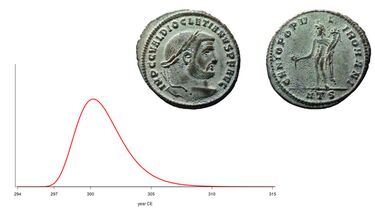Quantifying Uncertainty in Expert Archaeological Dating Evidence
A Leverhulme Trust funded Research Project (RPG-2023-323)

Project Summary
Understanding the sequence and timing of events in the past is a key component of all modern archaeological excavations. Archaeologists typically use the sequence of the layers (or stratigraphy) to understand the order of events. The dates (or timings of events) are then usually obtained from two complementary sources: scientific dates (like radiocarbon dating) and cultural finds (like discarded personal belongings and broken tools). In general, however, hardly any dates on excavated objects are precise; they are only estimates. The uncertainties on scientific dates are now well understood and are part of the date estimate provided by the scientific laboratory. They take the form of formal probability distributions which list all the possible dates for the object in question, and the probability of each one happening.
Such dates are expensive and scarce, however. Dating estimates on cultural finds are much more common, but are inconsistently recorded across different types of finds and hard to manage within the statistical frameworks used for interpreting scientific dates. Traditionally, finds experts provide date estimates as ranges (e.g. AD 43-400), sometimes with textual qualifiers or even with question marks (to convey extra uncertainty), but almost never with any indication about which dates are most likely in the range or what form any extra uncertainty might take.
QUEADE is a collaboration between statisticians and archaeologists in which we are developing protocols and software to allow cultural finds experts to tell us about their date estimates for archaeological objects via probability distributions, just like those used for scientific dates. This puts scientific and cultural date estimates on the same footing, allowing us to combine them using formal statistical methods and so improving the overall reproducibility (and FAIRness) of archaeological chronologies.
The methods we are developing are based on the Sheffield Elicitation Framework (SHELF) which is a package of documents, templates and software that were designed to allow the elicitation of probability distributions for uncertain quantities. SHELF has already been used with experts in a range of scientific and engineering fields (including psychiatry, climate change, nuclear safety and pharmaceutical development), but we are the first to use them with experts from the Arts and Humanities.
Project partners
- Principal Investigator: Prof Caitlin E. Buck (School of Mathematical and Physical Science, University of Sheffield)
- Co-investigator: Prof Jerermy E. Oakley (School of Mathematical and Physical Science, University of Sheffield)
Postgraduate Research Associate:
- Dr Marta Krzyzanska (School of Mathematical and Physical Science, University of Sheffield)
Archaeological experts:
- Keith May (Historic England)
- Prof David Wigg-Wolf (University of Leicester; ex-German Archaeological Institute, Frankfurt am Main)
- Dr Allard Mees (Leibniz Centre for Archaeology, Mainz)
